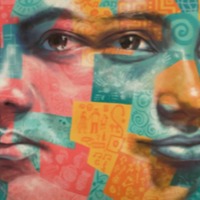
When I was 12 years old I was brought to the brothel.
[…]
I was working, cleaning dishes in someone's house. Then I noticed a woman and man following me around. They asked me why I would want to spend the rest of my life working here if I were so pretty. They took me to a café and drugged my food, they then took me to Delhi and told me that in less than a month I would be making more than Rs. 100,000. At first I thought I was going to be a housebuilding assistant and agreed to do the job. I was taken to the railway station and then taken to another part of Delhi. There was a woman waiting for me at the railway station. That woman took me away. The woman's husband then raped me. I was then taken to a red-light area and forced to work. I got pregnant. I was forced to take heroin, beer and other strong alcoholic drinks. The brothel owners used to beat and torture us mercilessly. One time, a new girl had come to the brothel, I told her she should leave and described what they did to us. The girl tried to leave. But when the owner found out what I had told the girl, he beat me and kept me in a box for a whole night and day. The box was so small that I couldn't even sit up properly in it. Soon after, I was arrested by the police and taken to jail for one month, but I was told by a policewoman, who was hand-in-glove with the brothel owners, that I was better off back at the brothel and should go back because I would just suffer and die in prison. I was told I would be paid all the money I have earned when I got back to the brothel. I was then sent back to the brothel by means of the policewoman who, at the time, was claiming to be my mother. For doing this, I discovered that the policewoman was paid 5,000 rupees. There was one case in the brothel where I noticed that a pregnant woman was working even though she was less than a month from term. She was forced to take a client. As a result, both she and her child died. Her body was taken off in an auto rickshaw and dumped somewhere. I was told to keep it a secret, and if anyone asked, I was told to say that the woman had been in the hospital delivering her baby. This is how despicably the brothel owners looked after such cases.
[…]
Only some of the clients used condoms, most didn't.
[…]
The customer would deposit 360 rupees (US$8) at the counter, plus tips.
[…]
I have to buy food and clothing for my health from the money that I earn. But I didn't get any of it in my hand to spend as I chose. I feel annoyed and really bad about not getting any of the money they earned from my body.
[…]
No, the doctor only came to distribute condoms. And this was very rarely.
[…]
Yes, as I mentioned, I was forced to take heroin, beer and other strong alcoholic drinks.
[…]
There were no working hours, clients would come at all times of the day and even if we were eating we had to get up and go with the client.
[…]
I was there five years and was rescued by STOP when I was 17.
[…]
I was rescued in 2002 and was then sent back to stay with parents in 2004. My immediate family accepted me, but my uncles and aunts didn't. They taunted and abused me. I was stigmatized in my own village. When I left the brothel to come to STOP and then on to my family, I didn't know that I was pregnant. In fact, I was pregnant with a baby girl and I wanted to abort it because it was a forced pregnancy, but the state didn't allow me. When I had the child I was told to put it up for adoption because it was an attractive, light-skin-coloured child. I refused because they said at first that I couldn't abort it and now they wouldn't let me keep it. Then both my child and I fell sick and I contacted STOP to tell them that I wanted to come back. I don't feel motherly towards the child because it was a forced pregnancy and no one else at the home was obliged to look after their own children so I didn't see why I had to. But I still feel protective towards my baby.
[...]
The girls at STOP can do science, dance, music and other classes.
[...]
I don't hate them all [men]. It is only some men who go to brothels and use women, not all.
[…]
I don't know what I want to do with my future. I don't really think about my future. Mostly, I live from day to day. I am happy at the family home. Before, I used to feel suffocated, living a life of indignation. But it's so nice to be free. I am also seeing a bit of the world and can do what I like now. I am being trained in bag-making and stitching.
[…]
You can only do one thing. You can be instrumental in the punishing of the perpetrators, and force our government to punish the accused. You can - through your connections - bring our situation to light.
Narrative courtesy of UNODC









